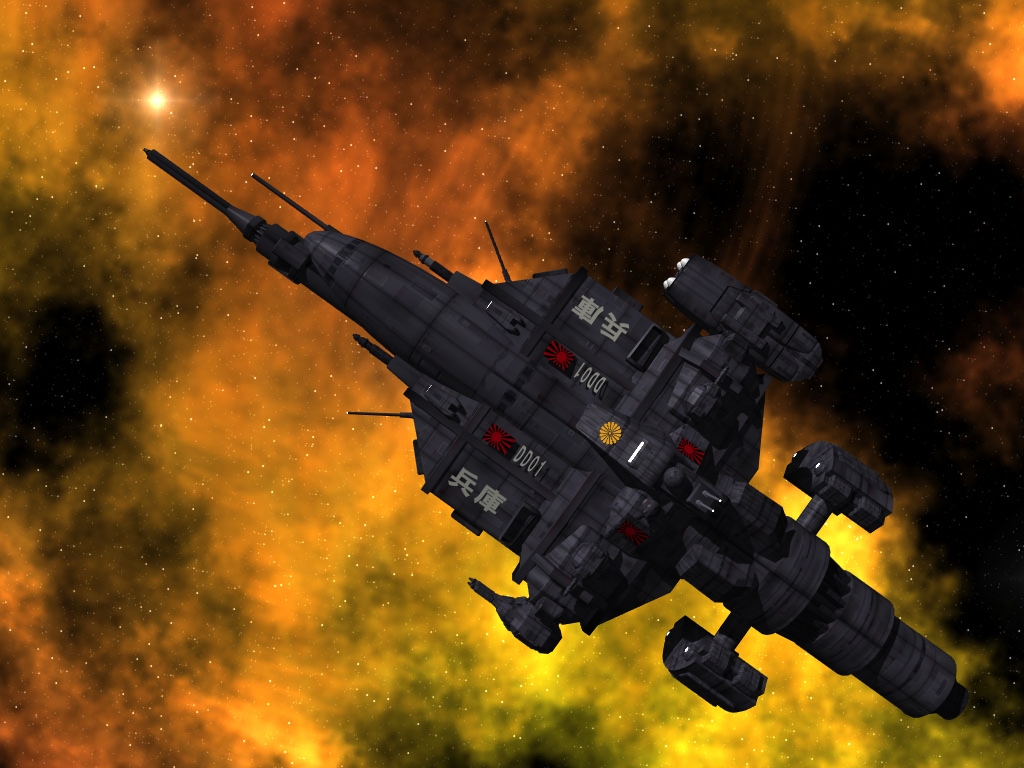|
|  |
|
|
|
|
| Note on canonicity: This entire page is non-canon, but except for details of the fusion power plant does not conflict with it. |
|
| Hyogo Class Destroyer |
|
|
|
|
| During the 2250s the Japanese Space Defense Force decided to build a new destroyer to replace the older French-designed vessels in operation. The Hyogo class was the result. It was envisioned as a patrol and light combat vessel, also functioning as an escort or screening vessel in fleet battles. The Hyogo followed the lead of the French Ypres design in having a fusion power plant installed. |
|
| Considerations in designing the Hyogo were long cruising range, endurance of 90 days, and the inclusion, for the first time in a Japanese vessel, of missiles. Landing parties, streamlining and landing capability were not included. |
|
| The name-of-class vessel, Hyogo, was laid down in 2253 and completed in 2256. Hyogo completed trials in August 2257, and series production of the class began with a production run of eight vessels. All the vessels in the series are named after Japanese prefectures. |
|
| Hyogo is armed with a Nakajima x4 -2 Particle Beam in a jack turret, and 4 Mitsue LL-2 x1 +1 Lasers single mounted in masked turrets. Hyogo also has a total of 4 missile launch bays, originally carrying Ritage-1 missiles. |
|
| After the Central Asian War, the JSDF began a study to upgrade the Hyogo class. Battle reports and intensive analysis revealed that the missile armament was significantly more effective for the type of missions the DD was expected to be tasked for in the near future, and an extensive redesign was implemented. This led to the design of the Kanagawa-class DD, and later replacing the former particle beam and single Ritage-1 missile pack with dual Ritage-2 missile packs, carrying a total of eight missiles. |
|
|
|
|
|  |
|
|
|
|
|
Ship specifications
- Mass: 2775 tons
- Warp efficiency: 3.339 Travel, 2.936 Combat
- Fuel: 60 tons for lander
- Range: 7.7 light years
- Cargo Capacity: 200 tons
- Crew: 54 (14 Bridge, 11 TAC, 9 Engineering, 3 small craft and pilots, 10 troops, 5 stewards, 2 medical)
- Passengers: 4
- Comfort: 0
- Emergency Power: 60 hours
- Total Life Support: 60 for 90 days
- Cost: MLv 107.51 (includes 0 missiles, and 9 targeting computers)
|
|
| Ship Status Sheet
- Move: 7 Travel, 6 Combat
- Screens: 2
- Radiated Signature: 5 (6)
- Radial Reflected: 5
- Lateral Reflected: 7
- Armour: 2
- Hull Hits: 35
- Power Plant Hits: 23/5
- Active: 10
- Passive: 10
- Other: 1 External Magnetic Sling
|
|
| Weapons
- 1 x4 -2 PBWS in Jack Turret (Armour Save) bearing 128
- 4 x1 +1 Lasers in Masked Turrets bearing 2x1234, 2x1678
Ordnance Load
- 8 Ritage-2 missiles in 4 launch bays
Sensors and Electronics
- Spherical Active-10
- Spherical Passive-10
- Navigation Radar
- DSS
- Grav Scan
Crew Hits
- Bridge: Captain, Navigator, Helm, 1 Engineer, 2 Communications, 2 Computers
- TAC: 5 Fire Control, 4 Remote Pilots, 1 Flight Control, Active Operator, Passive Operator
Damage Control: 6 (plus spares)
|
|
|
|
|
| Class ships |
|
|
| IJS-DD01 |
Hyogo |
兵庫 |
2nd Combined Fleet (Tirane) |
| IJS-DD02 |
Shizuoka |
静岡 |
Decommissioned |
| IJS-DD03 |
Chiba |
千葉 |
Decommissioned |
| IJS-DD04 |
Kagawa |
香川 |
Decommissioned |
| IJS-DD05 |
Iwate |
岩手 |
Decommissioned |
| IJS-DD06 |
Nagano |
長野 |
2nd Combined Fleet (Tirane) |
| IJS-DD07 |
Niigata |
新潟 |
2nd Combined Fleet (Tirane) |
| IJS-DD08 |
Shimane |
島根 |
Decommissioned |
|
|
|
The Hyogo class is being phased out of service and as of 01 August 2303 only Hyogo, Nagano and Niigata remain in service. While scheduled to be retired in the early 2300s, the Kafer War has led to an extensive refitting program for the remaining three vessels, modifying them for primarily training roles. |
|
|
|
|
| Designed and backstory by John Carroll |

